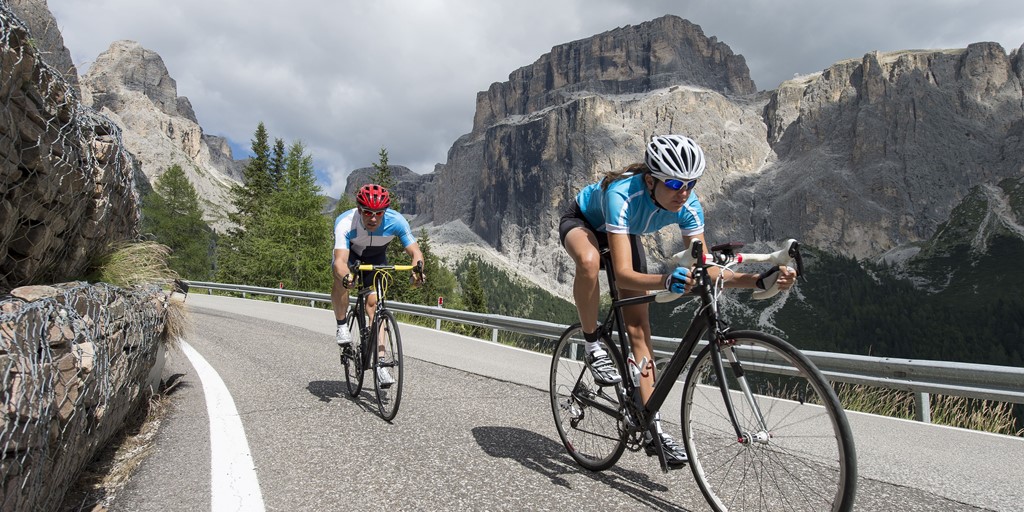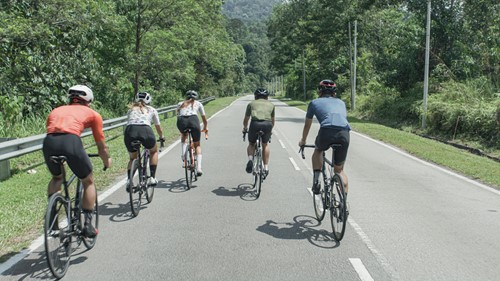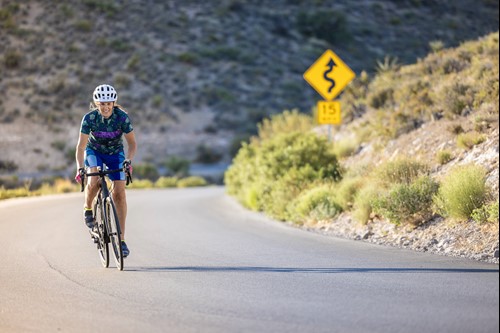Lizzie Deignan's top cycling essentials

With so many different products on the market, it’s hard to know which cycling essentials you should add to your repertoire. From what you’re wearing to the tech you take out with you on your rides, having the right accessories can help you perform at your best.
To find the best combination of cycling accessories that works for you, it’s worth researching the best products available and what other cyclists recommend. Your choices should also be informed by your budget and what you want to get out of your cycling journey.
Lizzie Deignan is a world champion track and road racing cyclist with multiple awards since the start of her cycling career more than ten years ago. In this blog, we explore Lizzie’s top cycling essentials and why they’re useful to have.
Lizzie Deignan’s top cycling essentials
It should go without saying that there’s one essential you should always have with you whilst cycling: a helmet. Although there’s no legal requirement to wear a helmet whilst cycling in the UK, if you ever were to have an accident, wearing a helmet can reduce the risk of head injury by 51%.
In addition to your helmet, take a look below at Lizzie’s top three cycling essentials:
Overshoes
Overshoes for cycling do exactly what they say on the tin: They go over your cycling shoes to protect your shoes and your feet from the elements. If you’re cycling in wet weather (which we unfortunately have a lot of in the UK), overshoes can help keep your feet warm, dry, and clean.
Not only that, as they act as a protective cover for your cycling shoes, they may be able to increase their longevity and save you from having to buy a new pair as frequently as you would if you weren’t using overshoes.
Some brands of overshoes may also make you more aerodynamic, as they create a smooth surface over your shoes, allowing you to cut through the wind more efficiently.
Lizzie says:
“Overshoes are something that I wouldn’t ride without for pretty much 9 months of the year in the UK. They are extremely warm and waterproof, and another thing that’s great about them is they protect your expensive cycling shoes and keep them white all year long.”
Gilet
Wearing a gilet while riding can not only help protect you from the wind, but you’ll be able to find some that can protect you from the rain, too. If you are susceptible to overheating while out on the road, a gilet may be able to help you regulate your temperature better due to the lack of sleeves.
Keeping your core warm is highly important while cycling so that your body continues to efficiently pump blood to the other parts of your body. If your core is cold then your body will reduce circulation to your extremities to conserve warmth.
They’re also usually very lightweight and easy to pack into a pocket if the weather changes whilst you’re out, so they can be invaluable when you’re unsure of the weather.
Lizzie says:
“Another of my favourite accessories is a gilet. We all know that in the UK you can have four different seasons in one hour and my gilet is bright as well, which helps ensure you’ll be seen. It’s also slightly waterproof and has a lot of wind protection in it. I just feel like if I’ve got my gilet, then I’m covered for any weather.”
Related: 6 top tips for long distance cycling

Bike Computer
Bike computers are a great asset to your training and for tracking your performance. They can help you track your speed, heart rate, power output, and more. You can then use this data to inform your approach to training and follow your improvement over time.
Using a bike computer can also help you plan your routes, as they usually have navigation information that provides insights on your chosen route. This can be really useful if you want to try new routes or travel the country while you’re training.
Depending on the bike computer you choose, you can also link it to a heart rate monitor or a power meter to gather more detailed information about your performance. Power meters can be particularly helpful in keeping a record of your performance and output over time.
Linking your bike computer to one of the many available cycling apps on your phone will also offer you some additional features.. For example, Strava lets you share your location with up to three of your contacts while you’re out and about as an added safety feature.
If you find that some healthy competition tends to push you to work harder, you can compete against other cyclists on the Strava app by logging your best time along segments of your route.
Lizzie says:
“Probably my favourite accessory is my Wahoo. My head unit tracks everything I’m doing in training whether its my distance, my power, or the temperature. I mean you name it, it has everything, every piece of data that you could imagine.
“Another great feature is obviously the maps on it. So, if I’m in a new place which I often am, at different bike races. The pre-race ride, I can quickly download a ride from the internet and have it there ready to go, so it’s a really valuable thing that I would be lost without.”
Looking for what essentials you should take with you for your bike? Check out our blog on 7 bike essentials you should never leave the house without.
More from Lizzie Deignan:

Whatever cycling essentials you choose to use whilst you’re out and about on your bike, having insurance can help provide financial protection and peace of mind should you experience damage, theft, and loss of your bike.
You can also get Public Liability cover through Cycleplan, which can help cover the costs involved should you be deemed liable for injury to another person or damage to third-party property while using your bike.
Find out more about how Cycleplan can help, or get a quick online quote today.
Please note the information provided on this page should not be taken as advice and has been written as a matter of opinion. For more on insurance cover and policy wording, see our homepage.







